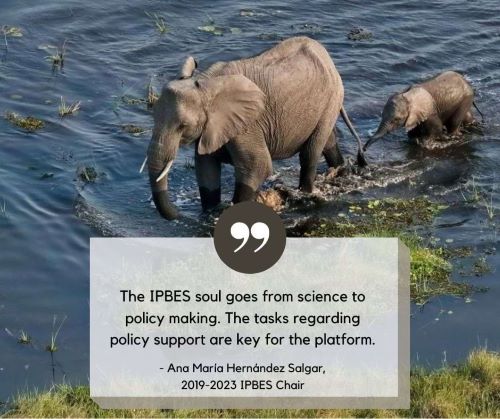How can IPBES best support policy? Make sure to include your ideas: sign up as a reviewer

IPBES is updating its activities for supporting policy. Sign up to review the concept note for the IPBES governing body: make sure that your ideas are considered.
In today's online dialogue with stakeholders, Prof. Eeva Primmer from the IPBES Bureau, Claire Brown from the Policy Support TSU, and Dr Simone Schiele, IPBES Head of Work Programme, introduced a draft concept note: it describes how IPBES will support policy in future. This concept note will be presented to the IPBES Plenary, the governing body.
The presenters emphasised that our engagement as stakeholders is essential in IPBES's support for policy: find out more below. For examples of policy tools and methodologies at IPBES, see the official website.
We are now invited to review the draft concept note and suggest how it can be improved. The deadline is 31 May 2024.

The authors are especially interested to learn:
- Does the concept note include the right set of activities for supporting policy?
- Is there something missing?
- Are the different activities well balanced?
You are of course welcome to include any other suggestions, as well. To sign up as a reviewer, follow the steps outlined in the official call.
How does IPBES support policy?
Alongside its assessments of biodiversity and nature's contributions to people, IPBES does a range of related work. This includes supporting policy:
- Activities to increase the policy relevance of IPBES assessments. Examples include workshops with practitioners, and ways to make IPBES assessments more relevant to policy.
- Activities to promote and support the use of IPBES products in decision-making. Examples include publishing factsheets that concisely summarise IPBES assessments, working with (sub)regional science-policy platforms, networks and assessments, and showcasing successful examples in the IPBES impact-tracking database (TRACK).
- Discussing the future of this part of IPBES's work with several stakeholders. This includes developing the concept note.
For details, see the current workplan.*
How has the concept note been developed so far?
IPBES has been working on the concept note since mid-2023, with input from stakeholders at various points:
- In October 2023, IPBES asked its members, observers, and stakeholders for input: on the policy support function, as well as policy tools and methodologies.
- In December 2023, IPBES included a dedicated session on the concept note during the dialogue meeting with IPBES National Focal Points in Bergen, Norway.
- In April 2024, IPBES has been hosting a series of dialogues on the concept note, including today's event. The draft concept note is now open for review.
Based on reviewers' comments, IPBES will then finalise the concept note for the 11th IPBES plenary session in December 2024.
How are stakeholders involved in IPBES's support for policy?
Today's presenters emphasised that IPBES operates at the global and regional scale: at the local level, IPBES relies on our support as stakeholders.
- Stakeholders can promote the establishment of national science-policy platforms, and national ecosystem assessments: this contributes to both capacity-building and policy support at IPBES.
- Stakeholders can develop practical guidance and convene workshops for decision-makers: how can they use policy options presented in IPBES assessments, at all levels, in their local context?
- Stakeholders can convene workshops among stakeholders in different sectors, including for example businesses: how can they use IPBES assessments? How can they help implement policy options in their context?
- Stakeholders can collect and compile policy tools that are available to implement the options presented in IPBES assessments. IPBES is also interested in the effectiveness of these tools in different contexts.
Have you been engaged in policy support as a stakeholder? Do you have ideas to share? Would you like to find out how IPBES is planning to support policy in future?
>> Review the concept note on policy support
*The workplan is part of of the IPBES Plenary's Decision IPBES 10/1 that you can download as a pdf or docx.
Photo by Marc on Adobe Stock: Elephant calf walking behind her mother in the Okavango Delta, Botswana. This landlocked African country ranks highly for its successful conservation, prominently supported by policy and government. Read more about conservation in Botswana in National Geographic.
